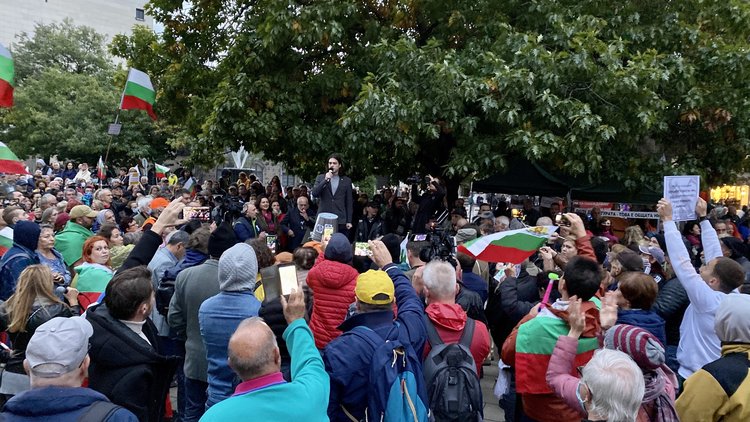Politics over Prevention

After a relatively calm summer period, with a total daily number of confirmed COVID cases varying from around 300 at the beginning of the summer to 600 in September, October has brought a significant surge of confirmed cases with around 1000 to Bulgaria. The percentage of positive tests out of the total number has climbed from 6%-12% to 25% as of mid-October. And every day marks a new record high of positive cases.
New testing methods raise questions
The surge in cases coincides with the general increase of the virus’ spread across Europe. Yet, the reasons for the sudden rise from around 600 to 1000 daily cases in Bulgaria in just a week is unclear. The drop of temperatures is often used as an argument for the booming virus spread, but this may not be the main reason. The country’s chief health inspector has explained that the testing methodology was changed and a greater focus is given to symptomatic and contact persons, but people wonder why this happened only now?
Doctors, nurses, equipment – all in short supply
Despite the claims of the Health Minister that the public health system is prepared and may well withstand the increase of cases, others say that hospitals are already overloaded and all beds for respiratory diseases occupied. The biggest problem, however, is the lack of medical personnel and equipment that is already in use of its full capacity. Furthermore, the regular work of hospital units or entire hospitals across the country is seriously impacted due to the virus as they need to temporary close when medical staff or patients are COVID diagnosed or when they need to be deployed in specialised COVID centres.
Public trust in government eroding
Amid this dramatic change in situation over the last week and days, the government seems to be in lethargy. Not able to afford the introduction of unpopular measures that would further ruin the limited public trust it has, the government of Boyko Borissov still claims that it has the situation under control, and no further restrictions are necessary. The Health Minister even implied that improving the control over the implementation of current measures would be just enough. No one as of yet has talked about closure of night clubs, restaurants, entrance restrictions in shopping malls or public transport, travel restrictions in the country etc. The Chief Health Inspector has noted in a TV interview that political decisions prevent the proper fight against the virus.
Meanwhile, the Health Minster announced mandatory face-masks in all open and closed public spaces. The measure was promptly accepted, without much of argumentation or debate. While an increasing number of schools and universities plan to close their doors again, with the University for World and National Economy in Sofia already having done so, night bars, discos, and amusement places operate at full capacity – with protective or distance measures being just a mirage.
As the spread is expected to be exponential, it is generally concluded that 30.000 new cases will be confirmed over a month, which would overhaul the all-time number of confirmed cases up to today in Bulgaria (29.500). Those numbers call for an immediate planning as they will have an impact on all sectors and future public policies.
Will the timeline for general elections hold?
The inconsistency in the state-led measures against the COVID crisis to date, in terms of health, economy, or social care undermine the state’s credibility to successfully cope with the situation and public trust in its authority is eroding. Despite heavy criticism, the state still does not seem to have a strategy or plan for coping with the crisis, especially after the sudden surge of the infection rates. Trust in the capabilities of the COVID Crisis Unit has already been compromised at the beginning of the summer, following complaints over its lack of expertise, dependence on the Prime Minister, and inadequate means of communication. As a result, its regular public briefings were cancelled. Yet, now those are starting again on a weekly basis.
The potential of a worsening of the situation, and introduction of additional restriction measures would definitely affect the preparations for the parliamentary March-April elections. If the elections are not postponed, the election campaigns will be very limited. Observers believe that this plays into the hands of the ruling GERB party which, as a governing body, also has the authority to allocate fast financial resources.
By: Ivaylo Tsonev
Project Coordinator for Bulgaria and North Macedonia